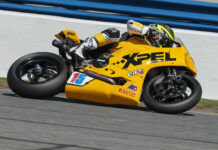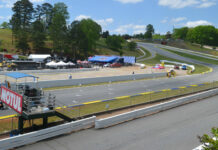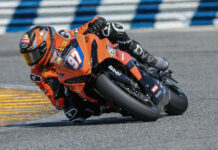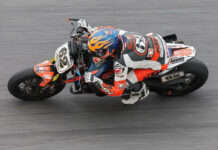FIRST PERSON/EDITORIAL:
Time For AMA Pro Racing To Consider All Stakeholders Instead Of Just The Factory Few
By John Ulrich
AMA Pro Racing staffers are quite open about their desire to eliminate Thursday Practice prior to AMA National Road Races, and they have already placed restrictions on who can and cannot participate. The restrictions currently in place were put into effect with no opportunity for racers and teams to make prior comment, and without any prior notice that the restrictions were even being considered.
The reasoning is that restricting and ultimately eliminating Thursday practice participation reduces costs to competitors. But in actual fact the restrictions now in place make it more difficult for riders not affiliated with full factory Superbike teams to be competitive, and eliminating Thursday practice altogether will make this situation worse, for more riders.
The theory behind the current restrictions is that factory teams do not want to spend the money to participate in Thursday practice, and cannot trust one another to simply make a deal to not participate in Thursday practice. Instead of restricting factory team riders as a class or restricting named factory team riders, the current restriction prevents any rider who is in the top 10 in 600cc Supersport or Superbike points from riding anything at a racetrack in the days prior to the start of official practice in Friday. The result of this, for example, was that in 2000 John Hopkins could not participate in Thursday practice at Sears Point, a track he had never raced at, because he finished ninth in the restarted 600cc Supersport race at Daytona. Because the race at Sears was cancelled, Hopkins was then precluded from participation in Thursday practice at Road Atlanta, and couldn’t even lead students around (on a stock GSX-R600 streetbike) during a school held there on Thursday.
Under the current restrictions, a rider who runs both 600cc Supersport and Formula Xtreme, for example, and who is in the top 10 in points in 600cc Supersport, will be prevented from practicing on his Formula Xtreme bike. For younger riders who are coming up in the Formula Xtreme class, this can be a serious safety issue since Formula Xtreme practice is already extremely limited on AMA race weekends.
At several times throughout the last two seasons, riders without factory rides have showed up in the top 10 places in 600cc Supersport points, examples being Brian Parriott and Josh Hayes in 1999 and Hopkins and Jake Zemke in 2000. The inclusion of such riders in the net cast by this rule was an unforeseen consequence of a flawed rules enacting process that did not allow general comment on rules prior to their enactment.
Beyond that, AMA Pro Racing should not be making rules tailored to reducing costs for a select, privileged few, i.e., factory teams. In the span of two weeks starting in mid-October 2000, two factory teams held exclusive test sessions, Suzuki at Daytona and Honda at Willow Springs. Honda also tested two weeks prior to the 2000 AMA National at Willow Springs. In a few weeks, a handful of teams will pay $8000 each for track time at Laguna Seca, not counting associated expenses such as hotel, fuel, etc. Most non-factory teams cannot afford to conduct such independent tests and must rely upon Thursday practice to set up their bikes and get their riders up to speed.
How important is Thursday practice? According to Jimmy Moore, the fact that he was able to participate in Thursday practice prior to the 2000 AMA National at Willow Springs made him competitive for the 750cc Supersport win there.
My own experience with young riders–including John Hopkins, Ben Spies and Chris Ulrich in 2000–is that they often struggle to come to terms with their set-up and riding in time for the main event EVEN WITH THURSDAY PRACTICE, and that they tend to be lost without it (at tracks such as Brainerd, which hasn’t held Thursday practice in recent years).
AMA Pro Racing staffers often cite the cost of Thursday practice to individual riders, saying they cannot afford it. What this means is that AMA Pro Racing is pandering to the factory teams at one end and riders with no money (i.e., riders without successful programs) at the other end, ignoring the mass of riders and independent teams in the middle.
On top of their ability to independently rent tracks for testing and practice, the factory teams (Suzuki, Kawasaki, Yamaha, Honda and Harley-Davidson) have formed a cartel to rent tracks on a cooperative basis for pre-season and in-season testing. The catch is that not only does participation in such tests cost each team $5000-$7500, the factory teams usually will not allow participation by non-cartel members at any price.
Other objections raised by AMA Pro Racing staffers to Thursday practice include a lack of standardized track prep and staffing (haybales, cornerworkers, ambulances), insurance coverage, and a lack of set-up access for TV crews. But in fact, the Thursday practices held prior to the 1999 AMA Nationals at Road America and Willow Springs and the 2000 AMA Nationals at Willow Springs included haybales, cornerworker staffing, three ambulances and rider medical insurance coverage, and, when asked, full cooperation with AMA Pro Racing staffers regarding requests to accommodate TV crews and their set-up needs. Setting minimum standards and asking for cooperation makes more sense than eliminating Thursday practice.
Eliminating or restricting Thursday practice penalizes the vast majority of riders and teams participating in AMA Pro Racing to benefit a tiny minority, i.e., factory teams which are willing to hamper everybody else to suit their own wishes. Thursday practice is not mandatory. Nobody is forced to participate. Any factory team that has blown its testing budget in stand-alone tests should be free to not participate. On the other hand, anybody who wants and needs to participate in Thursday practice should be free to do so.
If the current restrictions are such a good idea and serve the overall good of the paddock, why don’t they apply to all classes, instead of only the classes most favored by factory teams, Superbike and 600cc Supersport?
If reducing costs for factory teams is a legitimate goal of AMA Pro Racing, restrict off-season testing. Don’t penalize non-factory riders and teams and reduce their chance to be competitive by restricting or eliminating Thursday practice in the name of saving factory teams some money.
It is time for the AMA Pro Racing Board Of Directors to eliminate the current restrictions on Thursday practice and to reject any move to eliminate Thursday practice altogether.
And beyond that, it is time for the AMA Pro Racing Board Of Directors to come down firmly, and publicly, on the side of a rational process for making rules and regulations. It is time for the AMA Pro Racing Board Of Directors to publicly announce a new process that includes ample opportunity for all interested participants in AMA Pro Racing activities to comment before rules and regulations go into effect. It is time for the AMA Pro Racing Board Of Directors to open the lines of communication to all stakeholders in AMA Pro Racing, and to stop ignoring the many while catering to the factory few.






